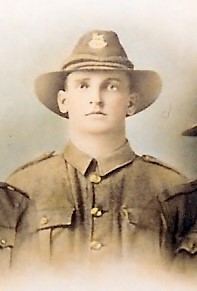Pte
Arthur Richard Stevens
Informations sur naissance
|
Date de naissance: 14/09/1891 |
|
Lieu de naissance: Ringarooma, Tasmania, Australia |
Informations générales
|
Profession: Miner |
Informations service militaire
|
Pays: New Zealand |
|
Force armée: New Zealand Expeditionary Force |
|
Rang: Private |
|
Numéro de service: 41659 |
|
Incorporation date: 03/11/1916 |
|
Incorporation nom de lieu: Wanganui, Manawatu-Wanganui, New Zealand |
|
Unités: — Otago Regiment, 2nd Bn. (Dernière unité connue) |
Informations sur décès
|
Date de décès: 04/12/1917 |
|
Lieu de décès: Polderhoek, Belgique |
|
Cause du décès: Killed in action (K.I.A.) |
|
Âge: 26 |
Mémorial
Distinctions et médailles 2
|
British War Medal Médaille |
|
Victory Medal Médaille |
Points d'intérêt 3
| #1 | Lieu de naissance | ||
| #2 | Lieu d'enrôlement | ||
| #3 | Lieu du décès (approximatif) |
Mon histoire
Arthur Richard Stevens was born in Ringarooma, Tasmania in 1891. He was the son of George Edward and Amelia Stevens. He had six brothers and one sister. In 1911, Arthur moved to New Zealand, where he worked as a miner. Arthur enlisted in November 1916. He was killed in action on December 4th 1917 during the attack on Polderhoek Château. At the time of his death he served in the Otago Regiment, 2nd Battalion.
The on Polderhoek Château took place on 3 December 1917. Two battalions of the 2nd Brigade, namely the 1st Battalion of Otago, on the left, and the 1st Battalion Canterbury, on the right, carried the attack. Though the 2nd Otago, were in reserve, and did not actively took part in the attack, it supplied over 400 men as stretcher-bearers.
The attack on the Polderhoek Château heights was an utter disaster. Things went wrong from the start. By some fatal miscalculation the allied artillery barrage fell on the first waves of the assaulting troops. Casualties were high. To flee from the friendly artillery fire, the men kept moving forward. This increased the amount of casualties, as the men ran straight towards the German machine-guns.
Reinforcements were sent forward to fill the gaps. Tough they were to no avail, as they too came under heavy machine-gunfire. It was not long before the attack was definitely held up. Some men did manage to reach the Château grounds, but any further advance was impossible, due to the heavy machine-gun- and sniper fire.
Orders were received to keep moving forward, but the New Zealand Battalion Commanders replied that any further advance was inadvisable, on account of the heavy casualties, which at that point had amounted to over 50 percent of the total strength. In addition, the German forces had been reinforced. It was therefore decided to abandon the attack and consolidate the line held, which was approximately 200 yards in advance of the original frontline. During the night of the 4th and 5th of December the men were relieved and the remnants of the attacking Battalions moved out of the frontline.
During the attack, 400 men of the 2nd Battalion of the Otago Regiment served as a stretcher-bearers. They continuously evacuated the wounded. Working throughout the day and the following night. The men of the 2nd Otago didn’t move back to their camp till the morning of the 4th of December 1917.
Arthur Richard Stevens, 26, was likely killed while evacuating wounded soldiers from Polderhoek. He has no known grave, and is remembered on the Buttes New British Cemetery New Zealand Memorial.
The on Polderhoek Château took place on 3 December 1917. Two battalions of the 2nd Brigade, namely the 1st Battalion of Otago, on the left, and the 1st Battalion Canterbury, on the right, carried the attack. Though the 2nd Otago, were in reserve, and did not actively took part in the attack, it supplied over 400 men as stretcher-bearers.
The attack on the Polderhoek Château heights was an utter disaster. Things went wrong from the start. By some fatal miscalculation the allied artillery barrage fell on the first waves of the assaulting troops. Casualties were high. To flee from the friendly artillery fire, the men kept moving forward. This increased the amount of casualties, as the men ran straight towards the German machine-guns.
Reinforcements were sent forward to fill the gaps. Tough they were to no avail, as they too came under heavy machine-gunfire. It was not long before the attack was definitely held up. Some men did manage to reach the Château grounds, but any further advance was impossible, due to the heavy machine-gun- and sniper fire.
Orders were received to keep moving forward, but the New Zealand Battalion Commanders replied that any further advance was inadvisable, on account of the heavy casualties, which at that point had amounted to over 50 percent of the total strength. In addition, the German forces had been reinforced. It was therefore decided to abandon the attack and consolidate the line held, which was approximately 200 yards in advance of the original frontline. During the night of the 4th and 5th of December the men were relieved and the remnants of the attacking Battalions moved out of the frontline.
During the attack, 400 men of the 2nd Battalion of the Otago Regiment served as a stretcher-bearers. They continuously evacuated the wounded. Working throughout the day and the following night. The men of the 2nd Otago didn’t move back to their camp till the morning of the 4th of December 1917.
Arthur Richard Stevens, 26, was likely killed while evacuating wounded soldiers from Polderhoek. He has no known grave, and is remembered on the Buttes New British Cemetery New Zealand Memorial.
Sources 6
|
Cenotaph https://www.aucklandmuseum.com/war-memorial/online-cenotaph/record/C14976?n=41659&w=World%20War%20I%2C%201914-1918&ordinal=0&from=%2Fwar-memorial%2Fonline-cenotaph%2Fsearch Sources utilisées |
|
CWGC https://www.cwgc.org/find-war-dead/casualty/1737523/stevens,-arthur-richard/ Sources utilisées |
|
Discovering Anzacs https://discoveringanzacs.naa.gov.au/browse/person/1018881 Sources utilisées |
|
Lieut. Bryne, A.E., "Official History of the Otago Regiment, N.Z.E.F. in the Great War 1914-1918", Eastbourne, Antony Rowe Ltd, 229-240. Sources utilisées |
|
Military Personnel File https://www.archway.archives.govt.nz/FullItem.do;jsessionid=EF4B5C6285D43A0A03E42ECD3BE65C73 Sources utilisées |
|
NZ-Project https://nzef.adfa.edu.au/showPerson?pid=243580 Sources utilisées |
